Do you often wonder what to use instead of white vinegar for cleaning your house? Maybe it’s the strong smell that sets your nose tingling, or the worry about its acidic nature damaging certain surfaces. Despite its touted cleaning prowess, using white vinegar doesn’t always prove to be the ideal solution for everyone. Thankfully, there are plenty of substitutes available that can do the trick just as well, if not better.
Vinegar serves as an effective, natural household cleaner due to its acidic properties, efficiently cutting through grime, removing stains, and neutralizing odors on many surfaces, such as cleaning toilets and appliances.
As a cleaning company that cherishes the health of your family and the environment, we at E.C. House Cleaning understand your need for effective, sustainable, and eco-friendly cleaning solutions. We firmly believe that getting your house squeaky clean doesn’t have to be at odds with the welfare of the Earth or your health.
Now, before we discuss eco-friendly cleaning alternatives, here’s what to expect:
- Baking Soda: An alkaline powerhouse suitable for a variety of surfaces.
- Liquid Dish Soap: A simple choice for quick, effective clean-ups.
- Hydrogen Peroxide: The unsung hero when it comes to eco-friendly sanitization.
- Alternative Varieties of Vinegar: A twist on the classic choice, with less nose-tingling effects to help you find the best vinegar to clean your home and help remove grease within the kitchen areas.
In the rest of this guide, you’ll explore these options and a few more in detail, understanding their benefits, and how to best utilize them.
Table of Contents
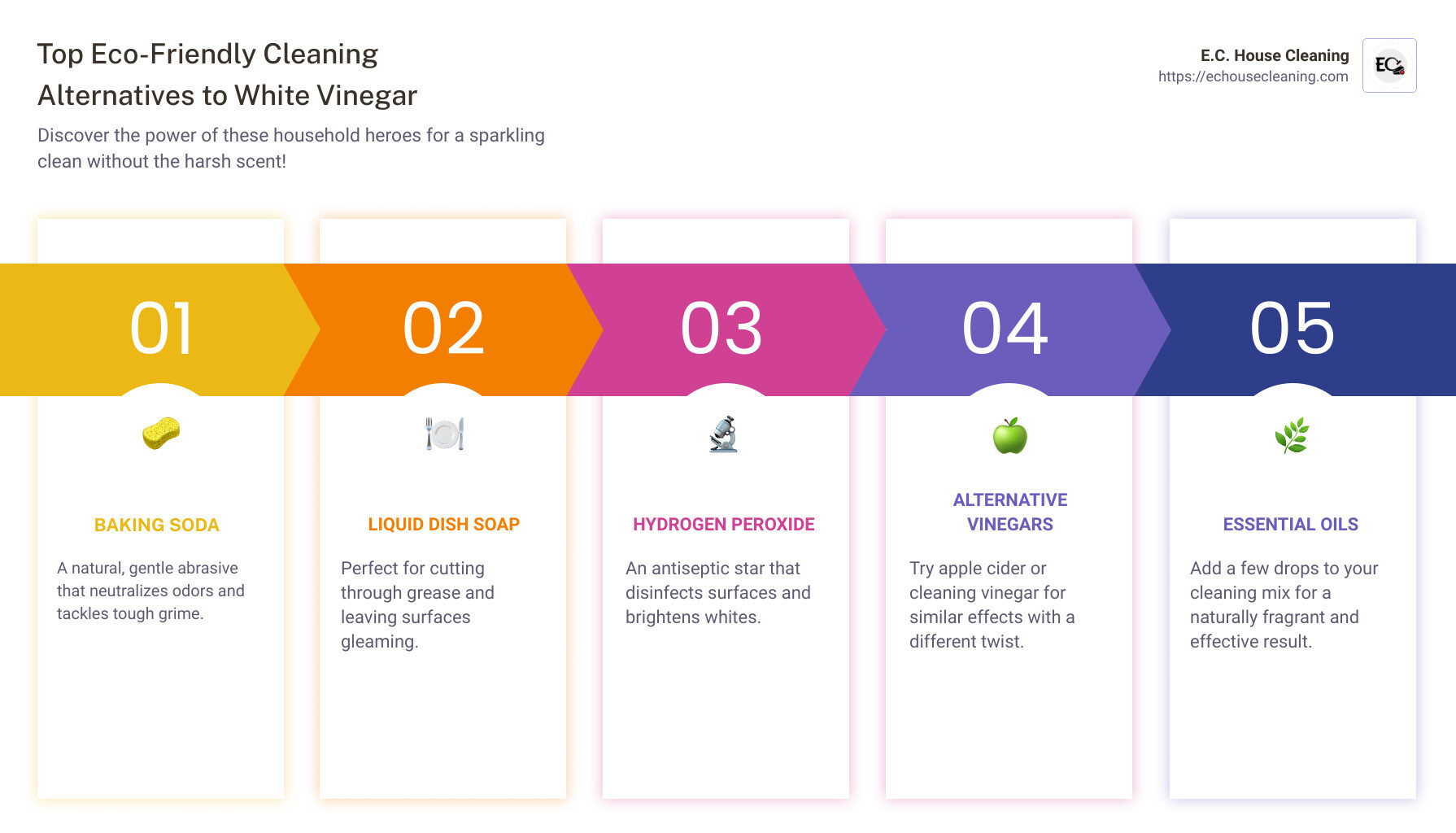
The Role of White Wine Vinegar in Cleaning
White vinegar is a household staple that’s often reached for when tackling a variety of cleaning tasks. But why is it such a popular choice, and are there any drawbacks to its use? Let’s delve into this common cleaning ingredient and explore ‘what to use instead of white vinegar for cleaning‘.
Why White Vinegar is Commonly Used for Cleaning
White vinegar owes its cleaning prowess to its acid content. The acetic acid present in white vinegar, around 5%, offers both cleaning and disinfecting properties. It’s colorless and doesn’t leave stains, making it a go-to for surface cleaning, free of toxic chemicals.
White vinegar is known to cut through grease, remove mildew, and combat odors. Its acidity is also useful in reducing mineral deposits from hard water. You’ll often find it recommended for cleaning kitchen appliances, bathroom fixtures, and even floors.
Undiluted white vinegar could also be used for extra strength household cleaning tasks, like removing touch stains. While white wine vinegar could be used to clean glass and kitchen countertops.
In addition, the fact that it’s a natural product and readily available adds to its appeal. Unlike some commercial cleaners, it’s non-toxic and doesn’t leave behind potentially harmful residues or fumes.
Limitations and Drawbacks of Using White Vinegar
However, white vinegar isn’t a cure-all for cleaning tasks. Its acidic nature, while beneficial for some cleaning tasks, can be damaging to certain materials. For example, it’s not recommended for use on natural stone surfaces like marble or granite, as it can etch the surface.
- White distilled vinegar is unsuitable for wood surfaces, as it can dull the finish.
- The strong, distinctive smell of vinegar acidic properties can be off-putting to some people. While the smell usually dissipates as it dries, it can linger in enclosed spaces or on certain materials.
- Another limitation lies in its disinfecting ability. While vinegar has some antibacterial properties, it’s not effective against all pathogens, including certain viruses and bacteria.
- There are some stubborn stains and deposits that vinegar alone can’t tackle. This is when you might find yourself asking ‘what to use instead of white vinegar to clean’?
We’ll explore some clever alternatives to white vinegar in the following sections, so you can choose the most suitable product for your cleaning needs without compromising on effectiveness or safety.
Alternative 1: Apple Cider Vinegar
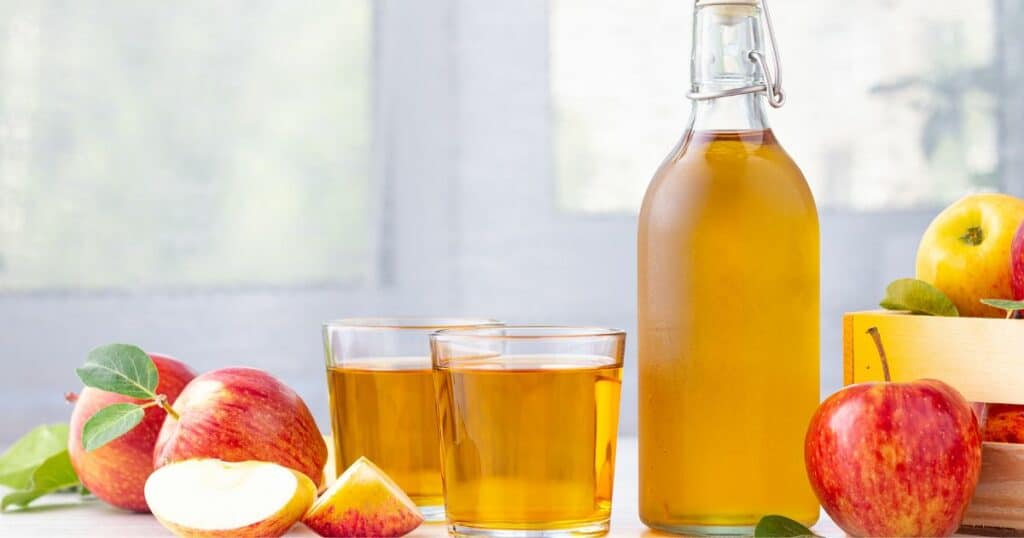
Description of Apple Cider Vinegar and Its Cleaning Properties
Apple cider vinegar, often referred to as ACV, is our first alternative to white vinegar. This brown vinegar, derived from fermented apples, has long been celebrated for its various health benefits. But did you know that it’s also a fantastic natural cleaning agent?
Just like white vinegar, ACV is acidic, which makes it a potent adversary against bacteria and germs. However, it has a milder smell than white vinegar, which some people find more pleasant.
How to Use Apple Cider Vinegar for Cleaning
Using apple cider vinegar for cleaning purposes is quite straightforward. You can use it undiluted or mix it with water in a 1:1 ratio, depending on the toughness of the dirt or stain you’re dealing with.
For cleaning hard surfaces like countertops or kitchen appliances, simply spray your ACV solution onto the surface and wipe it clean with a damp cloth. For stubborn stains on fabrics, try applying a small amount of undiluted apple cider vinegar directly onto the stain before washing.
Apple cider vinegar is brown, so avoid using it on light-colored fabrics or surfaces where it might leave a stain. Also, be sure to test a small area first if you’re unsure about the colorfastness of the material.
Precautions When Using Apple Cider Vinegar
While apple cider vinegar is a great alternative to white vinegar, it’s important to remember that it’s still acidic. Therefore, it should not be used on sensitive surfaces like marble or certain types of metal, as it could cause damage or discoloration.
Additionally, always use apple cider vinegar in a well-ventilated area to avoid inhaling the strong fumes. And if you’re using it to clean kitchen utensils or appliances, make sure to rinse thoroughly afterward to remove the vinegar taste.
So there you have it, our first alternative to white vinegar for cleaning — apple cider vinegar. It’s a natural, effective, and eco-friendly cleaning solution that we at E.C. House Cleaning love to recommend. We’re all about finding the best eco-friendly solutions for our clients, and apple cider vinegar cleaner certainly checks that box.
In the next section, we’ll discuss another common household item that can be used as a replacement for white vinegar when cleaning.
Alternative 2: Baking Soda
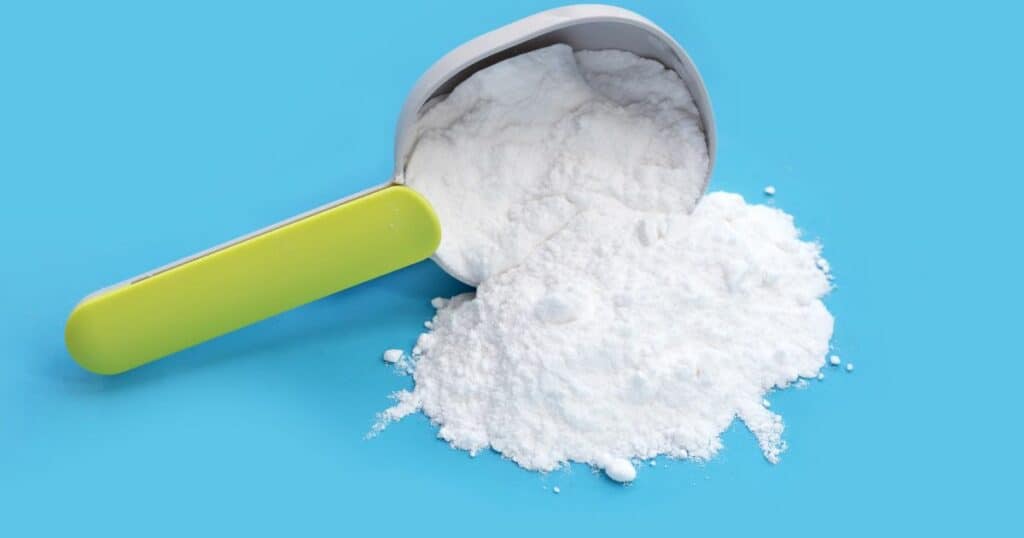
Description of Baking Soda and Its Cleaning Properties
Baking soda, also known as sodium bicarbonate, is a versatile cleaning agent that can be used as a substitute for white vinegar. It’s a white, crystalline powder that is mildly alkaline. Due to its alkaline nature, baking soda can help neutralize acidic substances and eliminate odors.
Like white vinegar, baking soda is a staple in many kitchens. But did you know it can also be a powerhouse for cleaning? It’s excellent for scrubbing away grime and tackling tough stains. Unlike white vinegar, it’s safe to use on most surfaces, including marble.
How to Use Baking Soda for Cleaning
Baking soda is versatile and easy to use for cleaning. For general surfaces, you can sprinkle baking soda on a damp sponge and scrub away. For tougher stains, you can create a paste by adding a little water to a tablespoon of baking soda. Smear the paste on the stain, let it sit for 20 minutes or so, then rinse it off.
Baking soda can also be used as a deodorizer. Sprinkle it on your sofa or mix it with your laundry to eliminate unpleasant odors. In fact, baking soda has a wide range of applications when it comes to cleaning.
Precautions When Using Baking Soda
While baking soda is a safe and natural cleaning solution, it’s still a good idea to take some precautions. Always test it on a small, inconspicuous area first to make sure it won’t damage the material. Also, be aware that baking soda can be abrasive, so avoid using it on delicate surfaces that could easily be scratched.
Baking soda is just one of the many alternatives for those wondering what to use instead of white vinegar for cleaning. We’re committed to helping you maintain a clean, healthy home or office environment with the least possible impact on our planet.
Alternative 3: Liquid Dish Soap
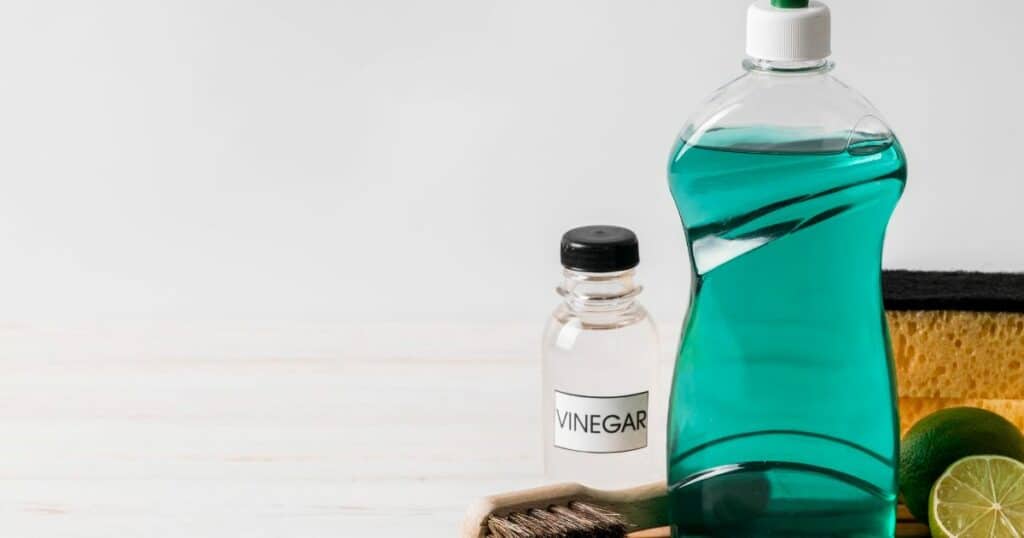
Description of Liquid Dish Soap and its Cleaning Properties
Looking for a versatile substitute for white vinegar? Look no further than liquid dish soap. This handy household staple is more than capable of tackling those stubborn stains and grime build-up.
Liquid dish soap works wonders when it comes to breaking down dirt and grease on various surfaces. While it may not boast strong disinfectant properties like natural vinegar, it can be a dependable option for general home cleaning tasks.
How to Use Liquid Dish Soap for Cleaning
Using liquid dish soap for cleaning is straightforward. Just mix a few drops of the soap in warm water and you have your DIY cleaning solution. This soap-infused water can be used to wipe down countertops, kitchen appliances, and other surfaces.
For tougher stains, you can apply the soap directly onto the affected area and let it sit for a few moments before scrubbing it off. Remember that liquid dish soap is particularly effective in dealing with greasy and oily stains.
Precautions When Using Liquid Dish Soap
One thing to keep in mind when using liquid dish soap is that it often needs to be rinsed off after cleaning. Unlike vinegar, which evaporates naturally, soap can leave a residue if not rinsed properly. This might require a bit more work, but it’s a small price to pay for a cleaning solution that is gentle on your surfaces and on the environment.
At E.C. House Cleaning, we understand the importance of using products that are not just effective but also eco-friendly. We are committed to recommending products that are safe for you, your home, and our planet. So, if you’re still pondering what to use instead of white vinegar for cleaning, liquid dish soap might be the solution you’re looking for.
Alternative 4: Hydrogen Peroxide
Serving as a more potent alternative to white vinegar, hydrogen peroxide is an eco-friendly solution that can effectively disinfect almost every surface in your home.
What Makes Hydrogen Peroxide a Good Cleaner?
Hydrogen peroxide is an oxidizer, meaning it’s capable of killing bacteria, fungus, and viruses. Its disinfecting power surpasses that of white vinegar, making it a handy alternative when you need to sanitize surfaces.
How to Use Hydrogen Peroxide for Cleaning
Using hydrogen peroxide for cleaning is straightforward. All you need to do is mix it in a 50/50 solution with water. Once you’ve prepared the solution, spray it on the surface you want to clean and let it sit for at least 5 minutes. This gives it enough time to kill any germs present, giving you a clean and sanitized surface.
It’s worth noting that hydrogen peroxide is also effective in removing tough stains, especially those caused by organic substances like blood, wine, and sweat.
Precautions When Using Hydrogen Peroxide
While hydrogen peroxide is a powerful cleaner, it’s crucial to handle it with care. Always use gloves when cleaning with hydrogen peroxide to protect your skin. Also, remember to store it in a dark container, as exposure to light can weaken its potency.
Hydrogen peroxide can bleach some materials. Therefore, it’s advisable to test it on an inconspicuous spot before applying it to a larger area.
At E.C. House Cleaning, we understand the importance of using cleaning solutions that are not only effective but also safe for your home and the environment. That’s why we recommend alternatives like hydrogen peroxide when you’re contemplating what to use instead of white vinegar for cleaning.
Alternative 5: Cleaning Vinegar
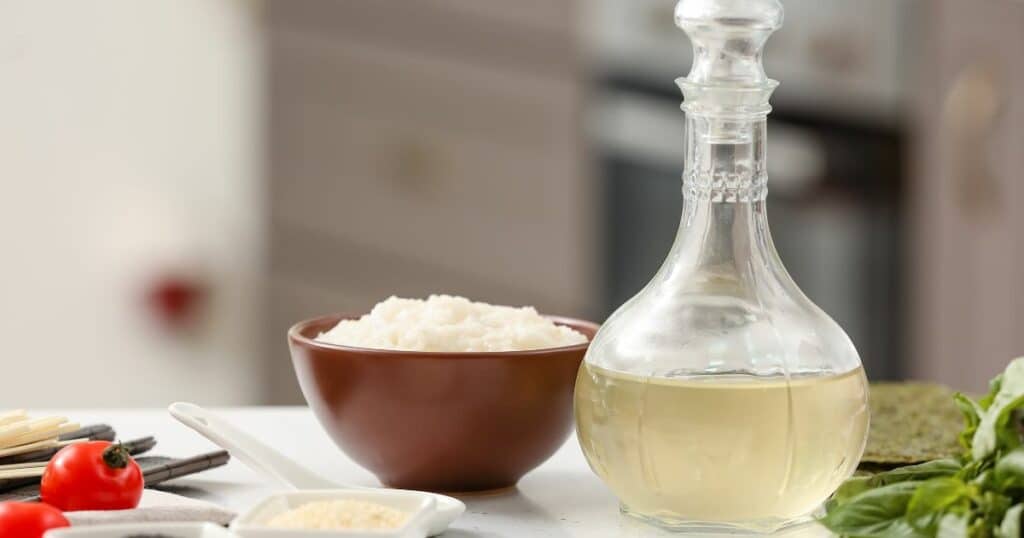
Now, it might sound counterintuitive to use another type of vinegar as an alternative to white vinegar, but let us delve into cleaning vinegar and see how it stands out.
Cleaning Vinegar: An Effective and Eco-Friendly Cleaner
Unlike the white vinegar that you commonly use in cooking, cleaning vinegar is a different product specially formulated for cleaning. It is made by fermenting alcohols distilled from corn or grains, a process similar to how white vinegar is produced. However, the difference lies in their acetic acid content. While white vinegar contains about 5 percent acetic acid, cleaning vinegar has around 6 percent acid, making it approximately 20 percent stronger.
This higher acidity level enhances its cleaning abilities, making it excellent for tackling grime and deposits around the house. It brings a natural, chemical-free approach to cleaning, aligning with our commitment at E.C. House Cleaning to promote eco-friendly cleaning solutions.
How to Use Cleaning Vinegar
A 1:1 solution of vinegar and water serves as an efficient cleaner for various household items. It works wonders on kitchen compost bins, sink caddies, and even watering cans. Simply soak the items overnight in the solution to get rid of stubborn scum and deposits.
For more challenging stains, you can also use cleaning vinegar undiluted. However, make sure to wear gloves to protect your hands from irritation.
Safety Precautions When Using Cleaning Vinegar
While cleaning vinegar is a safer alternative to harsh chemical cleaners, it’s important to handle it with care. Never confuse cleaning vinegar with industrial vinegar, which contains 20 percent acetic acid and can cause permanent damage to surfaces and release strong fumes.
Moreover, though you can combine cleaning vinegar with some other cleaners, like dishwashing liquid, never mix it with chemical cleaners like chlorine bleach. This combination can produce toxic fumes, posing a health hazard.
Can you mix vinegar with other cleaning supplies? Mixing vinegar with certain substances, like bleach or ammonia-based cleaners, can create potentially harmful fumes. These fumes can be dangerous if inhaled and may lead to respiratory issues or other health hazards. Professionals understand the chemical reactions that occur when different substances are mixed. They know the risks involved and are trained to handle potentially hazardous situations safely.
Alternative 6: Industrial Vinegar
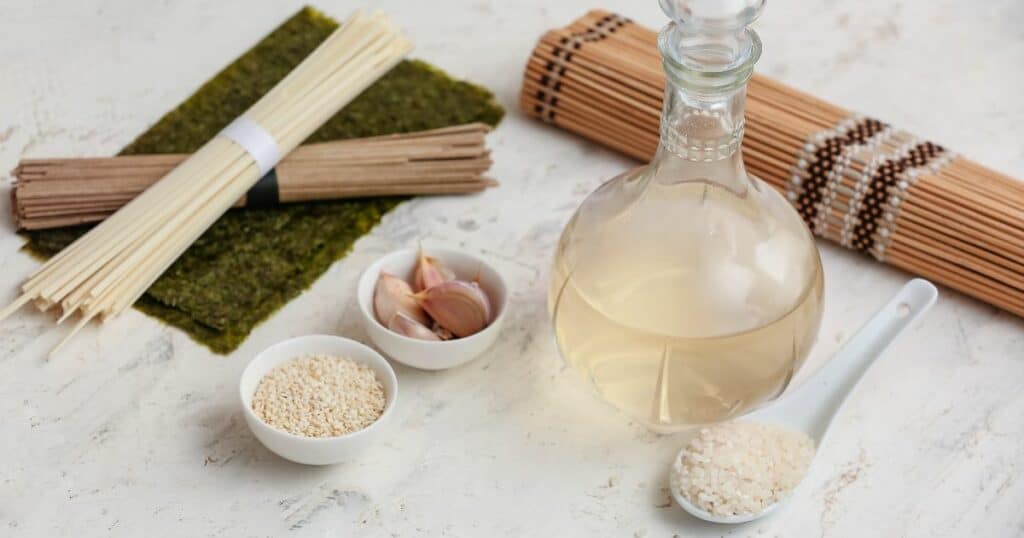
If you’re wondering what to use instead of white vinegar for cleaning, one powerful option you might consider is industrial vinegar.
Description of Industrial Vinegar and Its Cleaning Properties
Industrial vinegar is a potent cleaning agent that’s made in a similar way to white vinegar and cleaning vinegar. It’s created through the fermentation of alcohols distilled from corn or grains.
However, it differs in its high acid content – industrial vinegar contains about 20 percent acetic acid, making it significantly stronger than regular distilled white vinegar or even cleaning vinegar. Because of its greater acid content, it can be an effective cleaner for tough stains and stubborn grime.
How to Use Industrial Vinegar for Cleaning
When it comes to using industrial vinegar for cleaning, it’s recommended to dilute it with water due to its high acidity. A common ratio is one part vinegar to four parts water. This solution can be used for tasks such as removing tough calcium deposits, tackling stubborn stains, and dissolving tough grime.
Similar to the method described earlier for using cleaning vinegar, you can make an all-purpose cleaner by combining industrial vinegar with dish soap. Simply mix equal parts of industrial vinegar, dish soap, and water to help enhance the cleaning power.
Additionally, industrial vinegar can be used for tough outdoor tasks such as controlling weeds in your garden.
Precautions When Using Industrial Vinegar
While industrial vinegar can be a powerful cleaning tool, it’s important to use it with caution. Industrial vinegar releases strong fumes and can cause damage to certain surfaces, including floors and kitchen counters. Therefore, it’s vital to test it on a hidden area first to ensure it won’t discolor or damage the material.
Always wear gloves when using industrial vinegar to protect your skin from irritation. Furthermore, never mix industrial vinegar with bleach or other chemical cleaners, as this can result in the release of toxic fumes. As with any cleaning product, store industrial vinegar out of the reach of children and pets, and use it in a well-ventilated area.
Alternative 7: Essential Oils
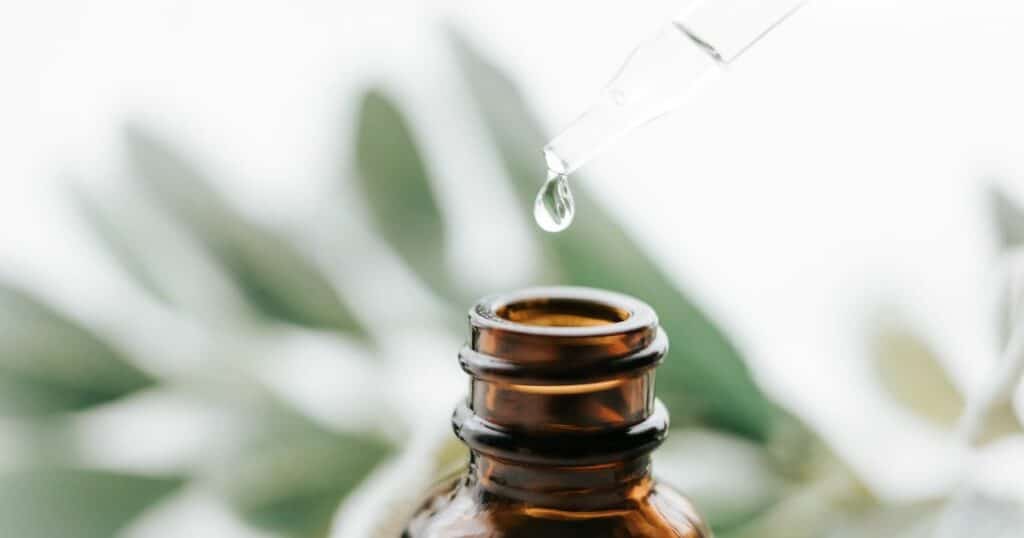
The last alternative in our list of what to use instead of white vinegar for cleaning is essential oils. Essential oils are naturally occurring, volatile aromatic compounds that are found in the seeds, bark, stems, roots, flowers, and other parts of plants. They are highly concentrated, making them an incredibly powerful cleaning agent when used correctly.
Description of Essential Oils and Their Cleaning Properties
Essential oils are not only known for their aromatic properties but also for their powerful cleaning abilities. They have antibacterial, antifungal, and antiviral properties, making them an effective solution for cleaning and sanitizing different surfaces and areas in your home. From lemon to tea tree, lavender to peppermint, essential oils can tackle a wide range of cleaning tasks without the harsh chemicals or the pungent smell of vinegar.
How to Use Essential Oils for Cleaning
Using essential oils for cleaning is simple. You can add a few drops of your chosen essential oil to a spray bottle filled with water, shake it well, and it’s ready to use. For a more potent solution, you can mix it with other natural ingredients like castile soap or baking soda. Some essential oils may have a strong scent. If you’re sensitive to strong smells, you might want to use them sparingly or choose milder oils.
Precautions When Using Essential Oils
While essential oils offer a natural and effective alternative to white vinegar, they must be used with care. Some essential oils can cause skin irritation or allergic reactions in some people, so it’s crucial to perform a patch test before using them for cleaning. Also, they can be harmful if ingested, so keep them out of reach of children and pets.
What to Use Instead of White Vinegar for Cleaning
Several alternatives to white vinegar for cleaning include apple cider vinegar, baking soda, liquid dish soap, hydrogen peroxide, cleaning vinegar, industrial vinegar, and essential oils. Each of these provides a unique set of properties that can effectively tackle a range of cleaning tasks, without the potentially damaging acidic nature of white vinegar.
It’s important to note that vinegar, a common household item, has been studied for its special cleaning strength in combating certain bacteria. Research suggests that vinegar, particularly its active component acetic acid, might exhibit some antimicrobial properties against tuberculosis bacteria and the flu virus. Moreover, when using vinegar or any cleaning product, it’s vital to consider safety measures, especially on sensitive surfaces or in areas accessible to children or pets.
E.C. House Cleaning for Eco-Friendly Cleaning Services in Massachusetts

At E.C. House Cleaning, we’re committed to providing top-notch, Massachusetts eco-friendly cleaning services. We understand the intricacies of different cleaning tasks and are well-versed in what to use instead of white vinegar for cleaning. We believe in the importance of a clean, healthy, and happy home, and we strive to provide that for all our clients, without compromising the wellbeing of our planet.
Still, have questions about cleaning solutions or our services? Don’t hesitate to reach out to us. We’re always here to help you make informed decisions about your cleaning needs. Interested in more cleaning tips and advice? Check out our blog for a wealth of information on different cleaning topics.
Our Content
All content is written by E.C. House Cleaning’s professional staff. We put our expertise in house cleaning services into each piece of content, focusing on providing valuable, accurate, and relevant information. With over 20 years of bathroom cleaning experience in the Massachusetts and Boston area with a proven track record of residental cleaning, best substitute for eco friendly cleaning supplies, and cleaning of toilets, shower drains and trust for customers as signaled by our hundreds of 5 star reviews, E.C. House Cleaning is an authority on residential and commercial cleaning services.
